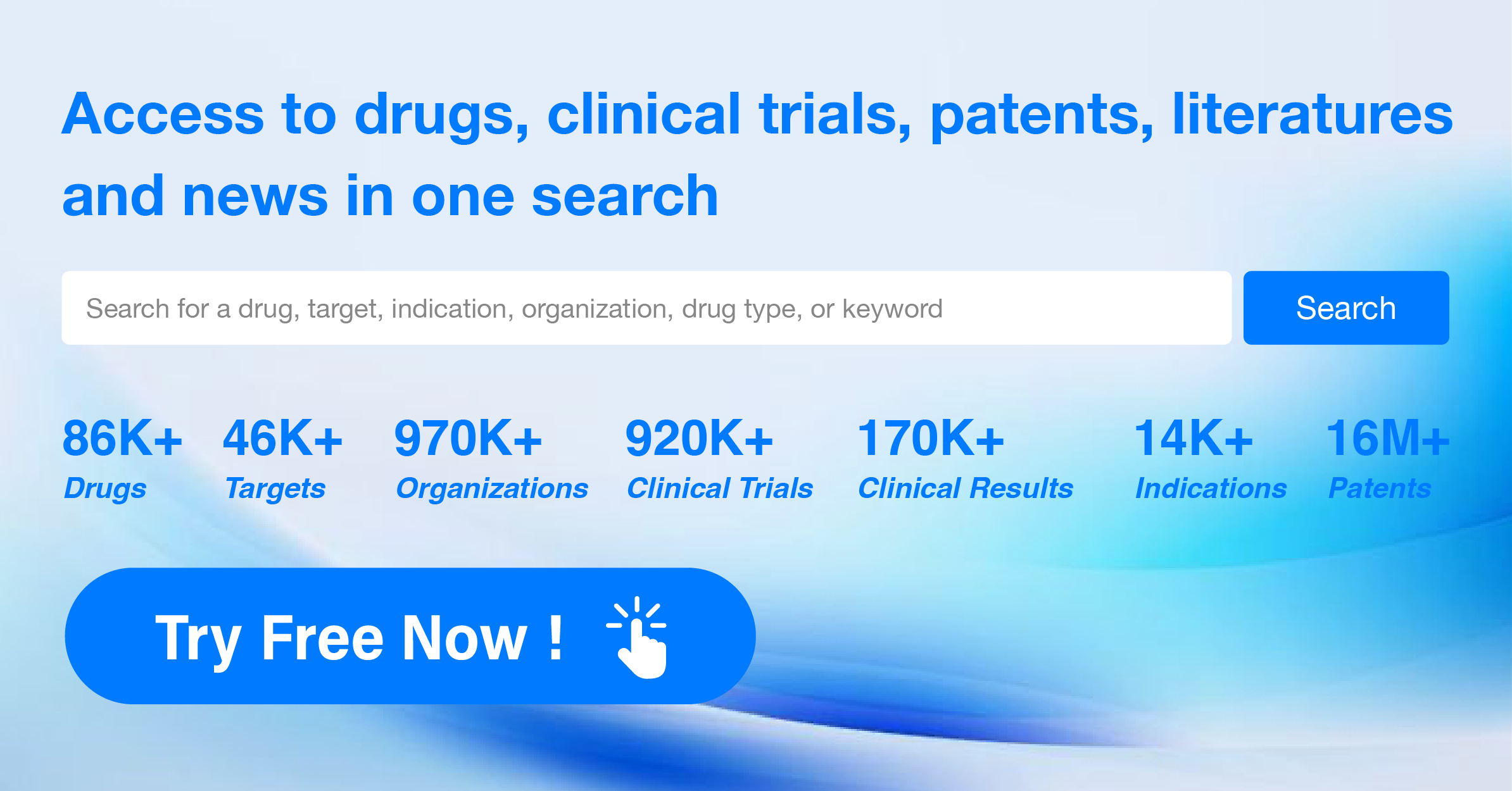Pharma Frontiers: Daily Digest of Global Pharmaceutical News - May 31
1.Over 60% of Cancer Patients Achieve Remission, Keytruda First-Line Combination Therapy Granted FDA Priority Review Status
On May 30, Merck (MSD) announced that the U.S. FDA has accepted the company's supplemental Biologics License Application (sBLA) for its blockbuster PD-1 inhibitor Keytruda. The application seeks approval for Keytruda combined with chemotherapy as a first-line treatment for patients with unresectable advanced or metastatic malignant pleural mesothelioma. The FDA has granted this sBLA Priority Review status, with a review completion date expected by September 25 of this year. This sBLA is based on data from the pivotal phase 2/3 clinical trial, IND.227/KEYNOTE-483. The final analysis results of this study were presented at the 2023 American Society of Clinical Oncology (ASCO) Annual Meeting, showing that Keytruda combined with chemotherapy significantly improved overall survival (OS), reducing the risk of death by 21% (HR=0.79, 95% CI, 0.64-0.98; two-sided p=0.0324). The median OS was 17.3 months (95% CI, 14.4-21.3) for the Keytruda combination group, compared to 16.1 months (95% CI, 13.1-18.2) for the chemotherapy-alone group. Keytruda combined with chemotherapy also showed significant improvement in progression-free survival (PFS) (HR=0.80, 95% CI, 0.65-0.99, two-sided p=0.0372). At 12 months, the estimated progression-free survival rate was 26% for the Keytruda combination group versus 17% for the chemotherapy-alone group. The objective response rate of the Keytruda combination was significantly higher than that of chemotherapy alone (62% vs. 38%, p<0.0001). In this study, the safety profile of Keytruda combined with chemotherapy was consistent with previously reported studies. Keytruda, developed by Merck, is a PD-1 inhibitor that blocks the interaction between PD-1 and its ligands PD-L1 and PD-L2. This action releases the immune response inhibition mediated by the PD-1 signaling pathway, thereby activating T lymphocytes that could affect both tumor and healthy cells. Consequently, it enhances the body's immune system's ability to detect and eliminate cancer cells. Since its initial FDA approval in 2014 for the treatment of advanced melanoma, Keytruda has received FDA approval for at least 16 types of cancer and for tumor-agnostic indications.
2.ORR Three Times Better than Standard Therapy: Investigational HER2-Targeted Bispecific Antibody Receives FDA Priority Review
On May 30, Jazz Pharmaceuticals and Zymeworks jointly announced that the U.S. FDA has accepted the Biologics License Application (BLA) for their investigational HER2-targeted bispecific antibody, zanidatamab, and granted it Priority Review status. This BLA is for the treatment of previously treated, unresectable, locally advanced, or metastatic HER2-positive biliary tract cancer (BTC) patients. The PDUFA target date for this application is set for November 29, 2024. If approved, zanidatamab will become the first HER2-targeted therapy approved by the FDA for the treatment of HER2-positive locally advanced or metastatic BTC patients.
The BLA submission is primarily based on data from the HERIZON-BTC-01 Phase 2b clinical trial, which evaluated the efficacy and safety of zanidatamab in patients with previously treated HER2-positive BTC. The primary endpoint of the trial was the confirmed objective response rate (cORR), as assessed by independent central review (ICR) in Cohort 1. As of October 10, 2022, data from 80 HER2-positive BTC patients in Cohort 1 showed an ICR-assessed cORR of 41.3% (95% CI: 30.4-52.8), while Kaplan-Meier curve analysis indicated a median duration of response (DOR) of 12.9 months (95% CI: 6.0-not estimable). Previous studies have shown a historical response rate of 5-15% for BTC patients receiving second-line standard-of-care chemotherapy.
Zanidatamab demonstrated manageable and favorable tolerability and safety profiles, with only 2 patients (2.3%) experiencing adverse events (AEs) leading to treatment discontinuation in the HERIZON-BTC-01 trial. No Grade 4 AEs were observed, and there were no deaths related to the treatment.
The HERIZON-BTC-302 Phase 3 clinical trial has recently been initiated to evaluate zanidatamab as a first-line therapy in treating patients with advanced or metastatic HER2-positive BTC, with patient recruitment currently underway. This global, open-label, randomized trial will compare the efficacy of zanidatamab combined with standard-of-care therapy to standard-of-care therapy alone in this patient population. HERIZON-BTC-302 is expected to serve as the confirmatory trial for zanidatamab in BTC treatment.
3.Lilly's RET Inhibitor Selpercatinib Receives FDA Accelerated Approval for New Indication
On May 29, according to the FDA's official website, Lilly's RET inhibitor Selpercatinib (brand name: Retevmo) received accelerated approval for the treatment of pediatric patients aged 2 years and older with metastatic thyroid cancer (including medullary thyroid cancer) carrying RET gene alterations, and pediatric patients aged 2 years and older with advanced solid tumors who have experienced disease progression during or following systemic treatment or for whom there are no satisfactory alternative treatment options. This is the first FDA-approved targeted therapy for pediatric patients under 12 years old with RET gene alterations.
The approval was primarily based on positive results from the Phase I/II LIBRETTO-121 study. This global, multi-cohort, single-arm clinical trial assessed the efficacy and safety of Selpercatinib (92mg/m2, orally, twice daily) in pediatric patients with advanced solid tumors or primary neural tumors carrying RET gene alterations. Efficacy analysis data was derived from 25 pediatric patients aged 2-20 years with locally advanced or metastatic solid tumors carrying RET activating mutations, who had no response to existing therapies or lacked standard systemic treatments. Results showed that the confirmed overall response rate (ORR) assessed by a blinded independent review committee was 48% (95% CI: 28, 69); the median duration of response (DOR) had not been reached (95% CI: NE, NE), with 92% of responders maintaining their response at 12 months.
Durable responses were observed in both pediatric and young adult patients, with an ORR of 43% (95% CI: 18%, 71%) in 14 patients with RET-mutant medullary thyroid cancer (MTC) and 60% (95% CI: 26%, 88%) in 10 patients with RET fusion-positive thyroid cancer.Concerning safety, the most common adverse events (incidence ≥25%) included musculoskeletal pain, diarrhea, headache, nausea, vomiting, COVID-19 infection, abdominal pain, fatigue, fever, and hemorrhage. The most common Grade 3 or 4 laboratory abnormalities (incidence ≥5%) were decreased calcium, hemoglobin, and neutrophil count.
4.Johnson & Johnson's Small Molecule Therapy Orexin-2 Receptor Antagonist Achieves All Phase 3 Clinical Endpoints, Significantly Alleviates Depressive Symptoms
On May 30th, Johnson & Johnson announced that the topline results from the Phase 3 clinical trial MDD3001 demonstrated that seltorexant, as an adjunctive therapy for depression, showed efficacy and safety in adults and elderly patients with Major Depressive Disorder (MDD) who exhibit symptoms of insomnia. Seltorexant is a potential "first-in-class" selective human orexin-2 receptor antagonist. This randomized, double-blind, placebo-controlled Phase 3 clinical study met all primary and secondary endpoints. Patients treated with seltorexant showed statistically significant and clinically meaningful improvements in depressive symptoms, based on the total score on the Montgomery-Åsberg Depression Rating Scale (MADRS) by Day 43. Moreover, it manifested improvement in sleep disturbances among patients who previously had a poor response to traditional antidepressants alone. Seltorexant displayed good safety and tolerability in the study, with similar incidence rates of common adverse events between the two trial groups. Seltorexant is an antidepressant therapy developed jointly by Johnson & Johnson and Minerva Neurosciences for the treatment of MDD. It is a potential "first-in-class" oral selective orexin-2 receptor antagonist. The orexin system in the brain is associated with metabolism, stress response, and wakefulness. Seltorexant works by inhibiting the orexin-2 receptor to reduce the excessive wakefulness symptoms occurring in MDD patients.
In addition, Johnson & Johnson also announced the results of Spravato nasal spray as a monotherapy in the Phase 4 clinical trial TRD4005 for patients with treatment-resistant depression (TRD). The study met its primary and secondary endpoints. This randomized, double-blind, multi-center study demonstrated that Spravato provided rapid, statistically significant, and clinically meaningful improvement in depressive symptoms approximately 24 hours post initial dosing and maintained efficacy throughout the 4-week treatment period. Spravato has been approved by the U.S. FDA for use in conjunction with oral antidepressants to treat adults with treatment-resistant depression and major depressive disorder (MDD) with suicidal thoughts or behaviors.
5.Zelgen Biopharmaceuticals' JAK/ACVR1 Dual Inhibitor Approved for Phase 2/3 Clinical Trials for Vitiligo Treatment
On May 29, Zelgen Biopharmaceuticals announced that its Jaktinib Hydrochloride tablets were approved by China’s National Medical Products Administration (NMPA) for Phase 2/3 clinical trials in treating non-segmental vitiligo in adolescents and adults aged 12 and above. Jaktinib Hydrochloride is a novel dual inhibitor of JAK and ACVR1 developed independently by Zelgen Biopharmaceuticals.
Vitiligo is a primary, localized or generalized depigmentation disorder of the skin and mucous membranes, commonly seen in clinical practice and classified as an autoimmune disease. Non-segmental (generalized) vitiligo accounts for approximately 85% of cases. Vitiligo can affect the entire body, with lesions more commonly appearing in areas exposed to friction. This condition often has a protracted course, severely impacting the psychological health of patients, especially children and adolescents with underdeveloped psychological resilience.
According to Zelgen Biopharmaceuticals' press release, Jaktinib significantly inhibits Janus kinases including JAK1, JAK2, JAK3, and TYK2, with the strongest inhibition observed for JAK2 and TYK2. The mechanism of action of Jaktinib involves blocking the JAK-STAT signaling pathway, directly or indirectly obstructing multiple related cytokine signal transductions, thereby inhibiting excessive or abnormal immune responses. Additionally, the product can inhibit Activin Receptor Type 1 (ACVR1) activity, reduce hepcidin transcription, improve iron metabolism imbalance, increase hemoglobin levels, and decrease the incidence of anemia and reduce transfusion dependence in patients with myelofibrosis.
Currently, Jaktinib Hydrochloride tablets are undergoing clinical research for several immunoinflammatory and fibrotic diseases. In October 2022, the NDA application for Jaktinib Hydrochloride for the treatment of intermediate-to-high-risk myelofibrosis was accepted by the NMPA and is presently under review. Moreover, Zelgen Biopharmaceuticals is conducting clinical trials for Jaktinib tablets in severe alopecia areata (Phase 3), moderate-to-severe atopic dermatitis (Phase 3), ankylosing spondylitis (Phase 3), idiopathic pulmonary fibrosis (Phase 2), and moderate-to-severe plaque psoriasis (Phase 2), among other autoimmune diseases.
6.Ribo Life Science's Antithrombotic siRNA Drug RBD4059 Approved for Phase II Clinical Trials in Europe
On May 29, Ribo Life Science announced that its independently developed antithrombotic siRNA drug, RBD4059, targeting FXI, has recently received Phase II clinical trial approval from the European Medicines Agency (EMA). This is a randomized, double-blind, placebo-controlled Phase II clinical study aimed at evaluating the safety, efficacy, and pharmacokinetics of RBD4059 in patients with stable coronary artery disease. According to Ribo Life Science's press release, RBD4059 has the potential for ultra-long-term antithrombotic effects with just one injection every six months. Anticoagulant drugs form the cornerstone for the prevention and treatment of thrombosis and have a wide range of indications, including coronary artery disease, peripheral artery disease, end-stage renal disease, atrial fibrillation, venous thromboembolism, and post-orthopedic surgery prophylaxis and treatment.
Currently, commonly used clinical anticoagulants, such as direct oral anticoagulants (DOACs), vitamin K antagonists (VKAs), and heparins, all have associated bleeding risks, hence there is an unmet clinical need for new anticoagulants that offer potency, long-duration effects, and lower bleeding risks. RBD4059 is a GalNAc-conjugated siRNA drug developed by Ribo Life Science based on its liver-targeting technology platform. It exerts its anticoagulant/antithrombotic effects by inhibiting coagulation factor XI (FXI) and blocking the activation of the intrinsic coagulation pathway. FXI is a key molecule in the intrinsic coagulation pathway, and increasing research indicates that inhibiting FXI can block the intrinsic coagulation pathway, providing a novel effective antithrombotic approach with lower bleeding risk for clinical patients.
According to Ribo Life Science's press release, compared to current treatment methods, inhibiting FXI holds promise as a more effective antithrombotic treatment option with lower bleeding risks. In Phase I clinical trials, RBD4059 demonstrated good safety and efficacy. Based on data previously presented by Ribo Life Science at the 2023 European Society of Cardiology (ESC) Congress, preclinical research data indicates that the product effectively and sustainably inhibits FXI expression and activity, offering long-lasting clinical efficacy and potentially improving patient compliance.
7.AstraZeneca's Potential 'First-in-Class' Small Molecule Clinical Data Shows Promising Results, Reducing Cholesterol Levels by Nearly 80%!
On May 30, AstraZeneca announced at the European Atherosclerosis Society (EAS) conference that its investigational oral PCSK9 inhibitor, AZD0780, achieved positive results in a Phase 1 clinical trial. When AZD0780 was used in combination with the statin drug rosuvastatin, it reduced low-density lipoprotein cholesterol (LDL-C) levels in patients by nearly 80%. AZD0780 entered Phase 2b clinical trials in January of this year for the treatment of dyslipidemia patients. Elevated plasma LDL-C levels are a major risk factor for cardiovascular diseases, estimated to cause approximately 2.6 million deaths globally each year. Despite the availability of multiple approved treatments, the global burden of dyslipidemia continues to rise. Over 70% of atherosclerotic cardiovascular disease (ASCVD) patients still do not achieve their LDL-C target levels, leaving the needs of high-risk patients for more diverse and effective treatment options unmet.
The Phase 1 trial aimed to evaluate the pharmacodynamics, pharmacokinetics, safety, and tolerability of AZD0780 in untreated hypercholesterolemia patients as a monotherapy and in combination with rosuvastatin. Subjects were administered either a placebo, 30 mg, or 60 mg of AZD0780 daily (n=15 per group) for four weeks. Another cohort included 35 subjects who took 20 mg of rosuvastatin daily for three weeks, followed by either 30 mg of AZD0780 or a placebo for four weeks. Analysis showed that in untreated hypercholesterolemia patients, AZD0780, on top of rosuvastatin treatment, resulted in a significant 52% reduction (95% CI: -57, -45) in LDL-C levels, leading to an overall decrease of 78% from baseline. Additionally, preliminary data comparing administration with food versus fasting were evaluated.
8.Fulian Pharmaceutical's PSMA-Targeted RDC Receives Clinical Approval in the U.S.
On May 30, Fulian Pharmaceutical announced that its PSMA-targeted radiopharmaceutical, 225Ac-FL-020, has received Investigational New Drug (IND) approval from the U.S. FDA for the treatment of metastatic castration-resistant prostate cancer (mCRPC). According to the press release, Fulian Pharmaceutical will promptly initiate a global Phase 1 clinical trial for the product. 225Ac-FL-020 is an innovative next-generation PSMA-targeted radionuclide drug conjugate (RDC) being developed by Fulian Pharmaceutical. The drug is designed to treat mCRPC and is expected to enter global Phase 1 clinical trials in 2024.
According to the press release, the targeting vector FL-020 was developed using Fulian Pharmaceutical's proprietary UniRDC™ platform, a technology that significantly enhances drug uptake at tumor sites while ensuring rapid systemic clearance. In preclinical models, 225Ac-FL-020 has demonstrated promising antitumor effects and favorable safety profiles. Moreover, 225Ac-FL-020 employs targeted alpha radiotherapy, which precisely targets cancer cells and reduces damage to healthy tissues.
In preclinical models, the radiolabeled FL-020 exhibited excellent in vivo distribution characteristics, including high levels and sustained tumor uptake as well as rapid systemic clearance. In LNCaP xenograft mouse models, 225Ac-FL-020 showed good antitumor activity and excellent safety profiles.The upcoming Phase 1 clinical trial is set to comprehensively evaluate the safety and tolerability of 225Ac-FL-020, along with investigating its antitumor activity in depth. This will lay the groundwork for further clinical development and is expected to offer more effective treatment options for mCRPC patients.
Fulian Pharmaceutical, founded in 2021, is an international radiopharmaceutical therapy company dedicated to building a comprehensive nuclear medicine company encompassing radiopharmaceutical research, production, and commercialization to benefit patients worldwide. The company aims to address current challenges in radiopharmaceutical development through innovative research focused on future treatment methods. In January of this year, Fulian Pharmaceutical announced the completion of a $63.3 million financing round to advance its radiopharmaceutical research and development.




